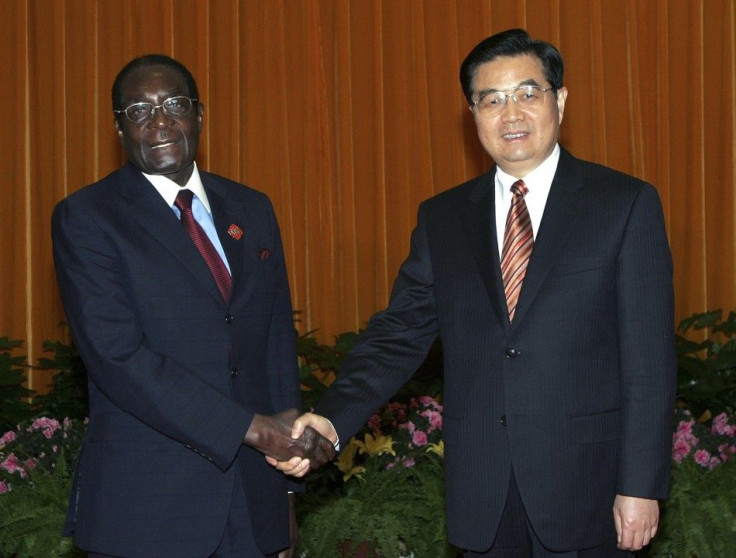Lambasting Chinese Companies Could Imperil African Workers, Analysts Say

Beijing solidified a business partnership with Zimbabwe last week that unionists say is responsible for abusive work environments across the southern African nation.
In a diplomatic visit of Zimbabwean officials to Beijing, both nations' ruling parties pledged to make good on a 2010 treaty, promising strengthened Sino-Zimbabwean political and economic cooperations.
But some Zimbabweans say that ties are strong enough.
Late last year, the Zimbabwe Allied Trade Workers Union Secretary-General Muchapiwa Mazarura reportedly said that strong ties between Beijing and Zimbabwean President Robert Mugabe's administration have enabled Chinese companies in Zimbabwe to operate above the law.
Mazarura explained that when Zimbabwean authorities were alerted to numerous accounts of the Chinese companies' physical abuse and underpayment, labor laws were not enforced.
We would like to warn the Chinese contractors who are operating in Zimbabwe that if they do not follow the laid-down laws, the union is going to take strong action against them, Mazarura told Newsday, a Zimbabwean newspaper.
Mazarura sent a letter to Zimbabwean labor authorities. In the past half year, there has been no substantive response, and the nation's unions have been engaged in countless similar battles to hold Chinese accompanies accountable to local laws.
The Chinese companies are exploiting us, said Douglas, a Zimbabwean construction worker represented by Mazarura, in a phone interview from Harare, Zimbabwe's capital. He asked to use his nickname in order to insure job security.
A general laborer, Douglas says he makes US$ .90 each hour. It takes him four and half hours, nearly half an entire workday, to make enough money for just one two liter bottle of cooking oil.
Although he says his salary is barely enough to support his wife and two children, physical safety is Douglas' chief concern.
We are working without safety clothes, he said, explaining that workers are not provided with necessary protective gear.
Douglas also said physical abuse and arbitrary dismissals are a daily fear for workers at his construction company.
There were some workers who were beaten and fired at work without payment. Once there was a truck of cement some guys were unloading. One bag fell off the truck, and they were beaten and fired immediately, Douglas said.
Douglas' opinion of Chinese enterprise in Africa has been soured by his experiences with his company.
The Chinese are not helping Africa, he said, They want us to work [without any] power.
Another construction worker from another company who called himself Claudios also has a very poor impression of Chinese people after his experiences with Chinese companies.
The Chinese are being very rude to us, he said, Because they are a rude society.
They are taking us a slaves. They don't want to use local labor laws.
Claudios said he often faces underpayment and late wages. Like Douglas, he also complained that he had not been given necessary protective gear.
Individual workers' accusations have translated into Mazarura's sweeping attack on all Chinese enterprises in the country.
Asked for a list of companies acting in breach of Zimbabwean labor laws, Mazarura said that no such list existed.
This is true of all the Chinese companies, Mazarura said.
In interviews with the Zimbabwean press, Mazarura addressed Chinese companies, never leveling complaints against specific enterprises.
Some analysts say attacking Chinese enterprises as a collective unit may worsen the situation of workers in Zimbabwe and across Africa.
The unionists ought to look at [the] picture in broader way, said James Shikwati, renowned expert on African economies, on the phone from Nairobi.
It's ok to speak to a specific problem, but you ought not demonize one player [in African international business]. If they tell the Chinese to get out, there's not going to be any competition. A monopoly would hurt the workers, because now, if Chinese companies aren't doing well, the workers can go work for [a] US company or they can go work for [an] Indian company.
Shikwati noted that while stories about exploitation and inhospitable work environments at Chinese companies are popping up all over Africa, one must still note that India, the US and South Africa have all had histories of exploiting labor in the region.
Meanwhile workers like Douglas and Claudios remain with Chinese companies that mistreat them because of crippling political economic instability.
In a country where you have people trying to go to neighboring nations like South Africa to work, people are happy just to have jobs, so if they are abused by their employers, that isn't much of a factor in their decision-making, said Melvin Ayogu, a fellow at the Brookings Institution's Africa Growth Initiative.
The Economics Bureau of the Chinese Mission to the United Nations was unavailable for comment at time of publication.
© Copyright IBTimes 2024. All rights reserved.




















